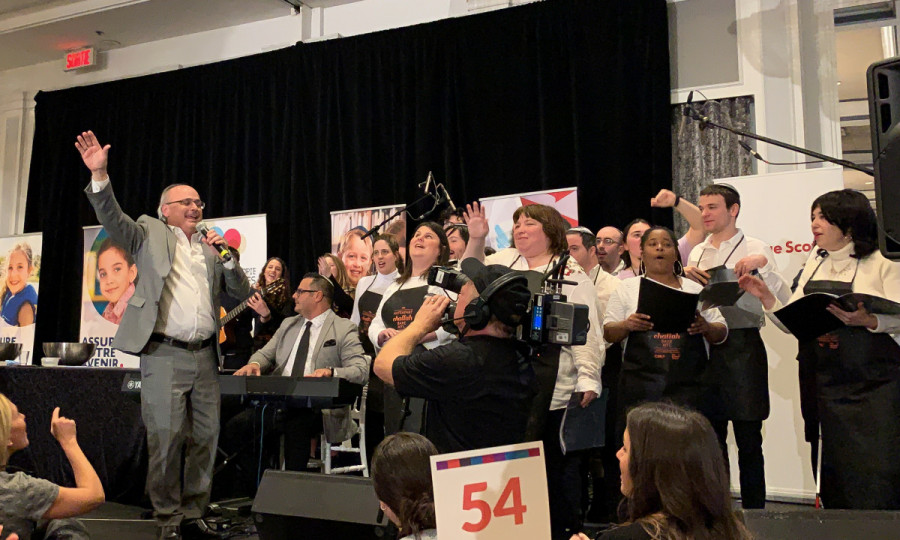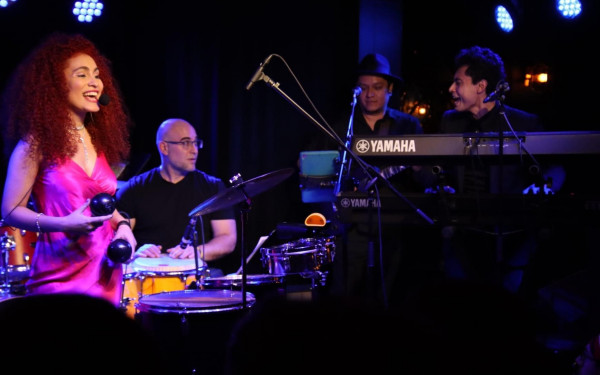Montreal Shira Choir Shines the Spotlight on Unlikely Stars
Choir Helps Differently Abled Singers Feel at Home
The Shira Choir is called to the stage for their musical debut. Some walk on stage with their heads held high, others are led by hand. Before them is a crowd of nearly a thousand people dressed to the nines, sitting under sparkling chandeliers. After taking a minute to scrutinize the room, some choir members give each other hugs and high-fives in excitement, others keep quiet. Then, the first piano notes play.
In front of a patient crowd, they unveil the result of weeks of practice. As they sing “Hallelujah,” among other songs, many women wipe away their tears, singing along and clapping.
The approximately 20 regular members of the Shira Choir are Montrealers who range from being in their 20s to their early 70s. They all have disabilities that affect their ability to function in society to various degrees.
On Nov. 14 they sang for the thousand donors, who joined in the making of the traditional Shabbat bread in the annual Challah Bake fundraising event hosted by the Federation Combined Jewish Appeal. For some, the Shira Choir is a source of light in their lives.
Cantor Daniel Benlolo was looking to promote inclusion, and unite people of all ages and abilities. He did so in the best way he knew how—with music. He founded the choir last May, arms wide open to anyone who wanted to join the group.
With every performance, the group aims to inspire and bring a smile to their spectators. “Music has the power to alter someone’s life,” Benlolo said.
Twenty-seven-year-old Amanda Cape has been part of the choir since last September. She was born at 24 weeks old, weighing one pound and seven ounces. She is blind due to her premature birth.

Upon graduating with honors from McGill University with a bachelors in social work in 2016, she held a few contract positions. However, she is considering pursuing higher education as she is struggling to find a permanent job within her field.
She joined the choir after looking for extra curricular activities to engage in. “Singing releases some of the daily stress that people go through. It has given me another form of escape and a creative outlet,” Cape explained.
She noted that when the choir meets up to practice, “members are treated with respect and dignity, as they should be, instead of being talked down to, as other people do to those who have a disability, whether it is visible or invisible.”
According to the Canadian Survey on Disability released in 2015, 0.6 percent of Canadian adults, which represents 160,500 individuals, were identified as having a developmental disability. More than a third of adults aged 15 to 64 experienced exclusion in the workplace, refusal of an employment position or a promotion because of their disabilities.
The Shira Choir is one of the few initiatives in Montreal that allows people to be a part of a milieu where their disabilities are not stigmatized, Cape explained. “We are encouraged to reach our full potential and achieve our dreams.”
“We are encouraged to reach our full potential and achieve our dreams.” —Amanda Cape
Rehearsals can be difficult for some newcomers, but the singers open up over time, Benlolo added. “They were not very verbal, and they looked at the floor all the time. After three or four rehearsals, I could already notice change,” said Benlolo. “Now, they are in the center of the stage, singing and dancing.”
The occasional pizza dinners that happen after some rehearsals give everyone a chance to interact and develop friendships, Benlolo added.
The choir welcomes any person with disabilities. Benlolo constantly witnesses people flourishing, even after just a few practices. “I see miracles. Mothers come to me crying.”
Volunteers are always there to help with organization but also to help choir members in the event of an outburst or a pre-show anxiety attack. Volunteers have learned how to deal with such situations, and have become a reassuring figure for the members of the Shira Choir, Benlolo explained.
Along with the people who were willing to invest their time in the group without monetary compensation, the Spanish & Portuguese Synagogue of Montreal has been lending their hall to the choir on a weekly basis for their meet-ups since their humble beginnings.
As time went by, they started catching the attention of people who are willing to pay for a show.
The group has also received multiple grants and donations from different non-profit organizations, which allow them to continue to flourish. The fundraising event hosted by Federation CJA is just an example of the many opportunities they get to sing for people.

Lenore Vosberg, Director of Clinical Services in the Center for the Arts in Human Development at Concordia University, specializes in creative arts therapy. She has been involved with the Shira Choir from its debut, and can attest to the positive impacts the choir has had on its members during the process.
“There was this one guy who has been very quiet and hasn’t sung at all from his first encounter with the choir. One day, he just sang a full song in front of everyone,” Vosberg recalled.
Benlolo saw this as a very powerful moment, and his mother, who sits in during the rehearsals to accompany her child, was crying.
Vosberg recalled another member with autism, who joined the choir about two months ago.
Even though he was taking private singing lessons outside of the choir, “he hasn’t demonstrated an understanding of the concept of being in a group and staying together because he would just wander around,” Vosberg explained. “Over time, he started staying more, and slowly started singing too.”
For a person with autism, a stimulating and noisy environment can be difficult to handle, but he was able to tolerate the November fundraising event, and even performed on stage with everyone else, she added.
One of the philosophies that make the Shira Choir a warm and welcoming environment is the tone of acceptance that Benlolo sets.
“He keeps saying that ‘we don’t talk about disabilities, we talk about special abilities,’ which I think helps [the choir members] feel welcomed, where their talent for singing is respected, while developing a sense of belonging,” said Vosberg about Benlolo. “This allows them to feel that they have got something to contribute.”
Having worked closely to the choir, Vosberg sees its members grasping the positive impact their singing brings to the spectators.
“This choir can contribute to entertaining and inspiration, which it does, like at the CJA fundraising event,” she said. “They choose songs that people know, and as the audience starts to sing along, and it gets everybody going, they feel very good.”
The effects of music on people, more particularly on the members of the Shira Choir have attracted the attention of the documentary filmmaker Evan Beloff. He will follow the group and look more into the individual lives of some of the choir’s members in the next couple years. Focusing on the power of music, the project will mainly be used for educational purposes.
As Cape continues to take part in the choir that so far has experienced great success, she is optimistic regarding the choir’s limitless future. She is looking forward to seeing where it will bring them, “especially with the possibility of travelling together in the future to perform. I would love to perform in Israel and overseas, as well as in the United States.”





_600_375_90_s_c1.jpg)

